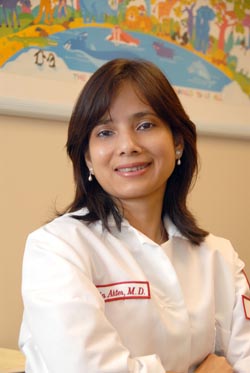Temple launches interdisciplinary child psychiatry program
 Photo by Kelly & Massa
Rashida Akter, M.D. (above), and Ellen Sholevar, M.D., provide and supervise services for Temple's new Child and Adolescent Collaborative Care Program.
|
According to statistics from the American Academy of Child and Adolescent Psychiatry, between 7 million and 12 million American youth suffer from mental, behavioral or developmental disorders at any given time. Yet many children don’t receive the help they need, either because parents don’t recognize the signs of a problem or don’t know where to turn for help.
A new collaborative effort between the Department of Psychiatry and Behavioral Science and the Department of Pediatrics at the School of Medicine is available to parents both in the Temple community and the greater Philadelphia region, for the evaluation and treatment of children and adolescents who may be suffering from emotional or behavioral problems. The Child and Adolescent Collaborative Care program, based at Temple University Hospital–Episcopal Campus, includes outpatient testing and evaluation, individual and family counseling and medication management. Rashida Akter, M.D., and Ellen Sholevar, M.D., are specialists in child and adolescent psychiatry who provide and supervise services. Sholevar is director of child and adolescent psychiatry and vice chair for education in the Department of Psychiatry and Behavioral Science. |
|
“It’s common for psychiatric problems to lead to academic difficulties, so we try to help parents figure out what’s really going on,” Akter said. “For example, if the child has a learning problem or attention deficit disorder, they can’t do their schoolwork. This can affect the child’s self-esteem, because they’re failing at school and think they’re ‘bad’ kids.” Akter noted that helping parents understand their child’s difficulties can be extremely beneficial when undergoing treatment, but many parents can’t find the help they need in the first place, due in large part to a shortage of child and adolescent psychiatrists. As a result, waiting lists for service tend to be lengthy. The doctors at Temple will perform both the counseling and the medication management, which is often not the case at other child and adolescent psychiatry programs,. “Children and parents won’t have to come in for or keep track of two different appointments, because everything will be done by the same person at the same time,” Akter said. For information on the Child and Adolescent Collaborative Care program, call 215-707-8496.
|
|